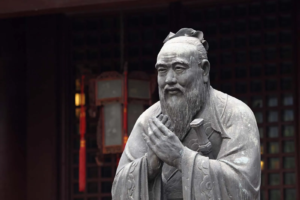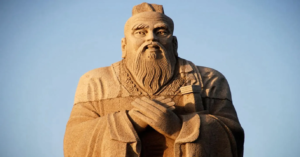Exploring Confucius’s Early Life in the Lu State: Origins of a Philosopher
The Grain of Wisdom: How Confucius Failures Planted the Seeds of Eastern Civilization

The rain fell in sheets that autumn morning in 497 BCE as Confucius stood at the Wei River’s edge, mud seeping through his straw sandals. Behind him: the homeland that had banished him. Ahead: fourteen years of wandering with only a dented carriage and his most loyal disciples. At fifty-three—an age when most scholars sought comfort—he faced a choice: surrender or become history’s most persistent teacher.He chose the river.
I. The Unlikely Sage: Before the Legend
The Boy Who Knew Hunger
Most statues show a serene elder, but young Kong Qiu was all sharp angles and restless eyes. Orphaned at three, he grew up in poverty so grinding that he:
- Worked as a shepherd (lost sheep often, distracted by books)
- Managed grain stores (fired for over-measuring to the poor)
- Attended funerals for meals, weeping genuine tears for strangers
“At fifteen, my heart was set on learning,” he later confessed—not as lofty declaration but as hunger. When wealthy peers mocked his patched robes, he shot back: “A gentleman is ashamed if his words exceed his deeds.”
The Grief That Forged a Philosopher
At twenty-three, his world shattered. His mother Yan Zhengzai—the woman who’d traded jade hairpins for his education—died. Confucius did something radical:
He buried her beside his father’s unmarked grave and sat in mourning for three years.
“Why waste prime years?” nobles scoffed. His answer reshaped Chinese culture: “Filial piety is the root of all virtue.” In that rain-soaked vigil, he discovered his life’s work—not governing kingdoms but healing human bonds.
II. The Marketplace Classroom: Wisdom in the Mud
Forget temple halls. Confucius taught where life happened:
The Butcher’s Stall Lesson
When disciple Zigong boasted of his haggling skills, Confucius led him to a butcher. “Notice how Master Ding’s blade never nicks bone?” he whispered. “He follows the Dao of the ox—honors its essence. You hack at prices, not truth.”
The Vinegar Tasting
Legend claims when Confucius tasted vinegar, he smiled—unlike Lao Tzu’s grimace or Buddha’s stoicism. Why? “He tasted life’s sourness not as punishment,” a disciple wrote, “but as essential seasoning.”
His Teaching Toolkit
- The Mirror Question: “When you see a worthy person, think how to equal them. When you see an unworthy, examine your own heart.”
- Radical Candor: To a ruler bragging about taxation: “There is starvation in your villages. Why are your robes embroidered?”
- Humor as Armor: When called “a leaking gourd” (useless but ornate), he laughed: “Better than a gourd that poisons!”
III. The Exile Years: When the Sage Was Human
The Night the Music Died
Confucius’s political exile began with betrayal. The Duke of Qi—whom he’d served loyally—sent him a “gift”: a troupe of singing girls to distract his principles. When Confucius protested, the Duke shrugged: “You’re too rigid for this age.”
That night, disciples spied him playing the qin (zither). The melody? A folk song about abandoned plows. “He wasn’t weeping,” wrote Yan Hui. “He was composing exile into wisdom.”
Near-Death in Chen
Trapped between warring states, Confucius’s group ran out of food. When fierce disciple Zilu demanded, “Must gentlemen suffer so?” Confucius—weak with hunger—responded:
“Yes. But ordinary people break under hardship. Gentlemen bend like bamboo and rise again.”
He then gathered disciples to recite poetry as their stomachs growled—a moment later memorialized as “the Chen starvation.”
IV. The Disciples: Flawed Vessels of Greatness
His true legacy wasn’t texts but transformed lives:
| Disciple | Flaw | Transformation |
|---|---|---|
| Yan Hui | Chronic poverty | Became “the vessel of virtue” who found joy in a bowl of rice |
| Zilu | Hot-tempered warrior | Died fixing his cap when attacked, choosing ritual over survival |
| Zigong | Wealth-obsessed merchant | Used fortune to build Confucius’s first school |
| Ran Qiu | Government climber | Resigned when ordered to tax the starving |
The Grief That Nearly Broke Him
When Yan Hui—his favorite—died young, Confucius did the unthinkable: wailed like a commoner. Disciples gasped at his loss of composure. His howl became philosophy: “Heaven has destroyed me! Destroyed me!“
Later, he confessed: “No one has moved me like Hui. He could hold half the truth and understand the whole.”
V. Confucius Kitchen as Sanctuary

Few know Confucius was a food philosopher:
Confucius Culinary Commandments
- “Do not eat grain that has turned sour” (Metaphor for corruption)
- “Ginger must never be removed from the table” (Its warmth aids digestion like ritual aids society)
- “The perfect sauce balances all without dominating” (Like virtuous leadership)
When Duke Ling served him rancid pheasant, Confucius rose silently and walked out—a protest recorded as China’s first restaurant critique.
VI. Confucius Bitter End & Sweet After life
Deathbed Wisdom
At seventy-two, knowing death neared, he called disciples. But instead of grand pronouncements, he fretted:
- “Has anyone checked on Zilu’s widow?”
- “The rites for my burial must be simple—no jade.”
- “I dreamt I was sitting between two pillars. My time is done.”
His last recorded words? “The great mountain must crumble…“
The Resurrection No One Expected
Banned and burned by China’s first emperor, Confucianism should have died. Then emerged Dong Zhongshu—a Han Dynasty scholar who argued:
“A house needs beams. A soul needs rites. A nation needs Confucius.”
Emperor Wu listened. Soon, exam candidates memorized the Analects, mothers taught filial piety, and a persecuted teacher became the bedrock of East Asia.
VII. Why Confucius Humanity Matters Today
The CEO Who Learned from Yan Hui
When Alibaba’s Jack Ma faced his darkest failure in 2011, he reread Confucius’s mourning of Yan Hui: “True strength isn’t avoiding failure—it’s how you grieve losses and regrow.” He rebuilt using Confucian team ethics.
The Modern “Rites” We Crave
Confucius’s li (rituals) weren’t empty traditions but “social grammar.” Today’s equivalents?
- Japanese tea ceremonies creating presence
- Family dinners without phones
- Work cultures valuing courtesy over disruption
Confucius Greatest Teaching Was Flexibility
Contrary to stereotypes, Confucius was no rigid traditionalist. When asked, “Should we repay hatred with virtue?” he countered: “Then with what will you repay virtue? Repay hatred with justice, virtue with virtue.”
Confucius Crooked Pine: A Final Metaphor
On Qufu’s temple grounds grows a cypress Confucius planted. Twice destroyed, it always resprouts from the roots—gnarled, asymmetrical, alive. Like his wisdom:
- It bends in political storms but doesn’t break
- Its seeds travel farther than expected (Vietnam, Korea, global boardrooms)
- It grows toward light but knows value lies in deep roots
“A gentleman is not a pot,” Confucius once said. Meaning: Don’t be a decorative container. Be living, adaptable, essential.
Epilogue: Your Confucian Moment
That meeting where you bit back anger? That was ren (benevolence).
When you taught a junior colleague patiently? That was xiao (mentorship as filial piety).
Your quiet insistence on integrity? That’s yi (righteousness).
Confucius lives wherever we choose:
- Ritual over rush
- Roots over trends
- Reciprocity over exploitation
His ultimate lesson?
“We are all exiled rivers carving new paths home. The sage is just the one who remembers the source.”
Sources Reimagined:
– Analects: Translated not as scripture but as workshop notes from a struggling teacher
– Sima Qian’s Records of the Grand Historian: Read for emotional subtext between lines
– Confucius: The Secular as Sacred by Herbert Fingarette (1972): Key modern interpretation